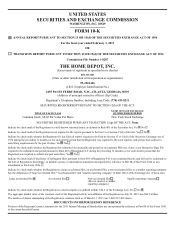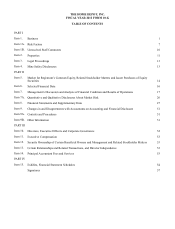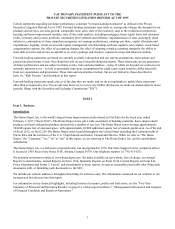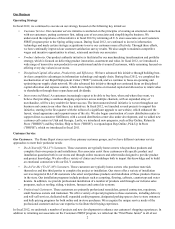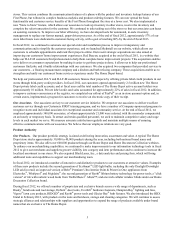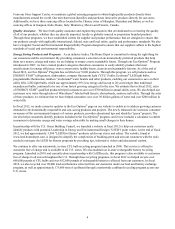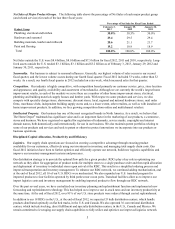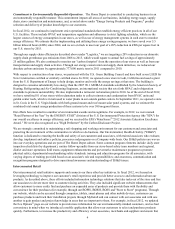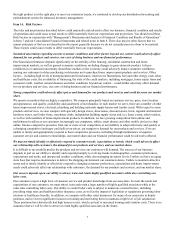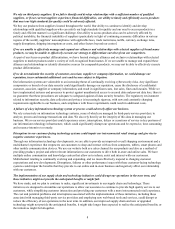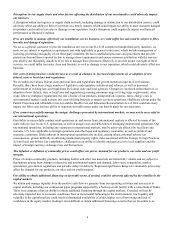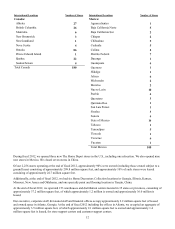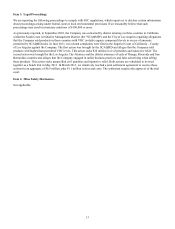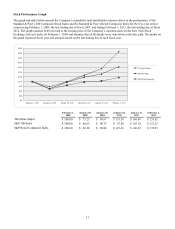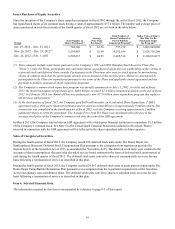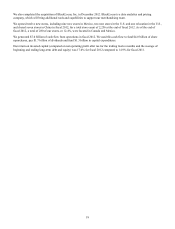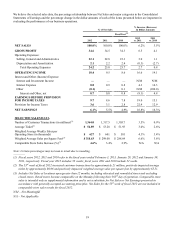Home Depot 2012 Annual Report Download - page 15
Download and view the complete annual report
Please find page 15 of the 2012 Home Depot annual report below. You can navigate through the pages in the report by either clicking on the pages listed below, or by using the keyword search tool below to find specific information within the annual report.
9
Disruptions in our supply chain and other factors affecting the distribution of our merchandise could adversely impact
our business.
A disruption within our logistics or supply chain network, including damage or destruction to our distribution centers, could
adversely affect our ability to deliver inventory in a timely manner, which could impair our ability to meet customer demand
for products and result in lost sales or damage to our reputation. Such a disruption could negatively impact our financial
performance or financial condition.
If we are unable to manage effectively our installation service business, we could suffer lost sales and be subject to fines,
lawsuits and damaged reputation.
We act as a general contractor to provide installation services to our D-I-F-M customers through third-party installers. As
such, we are subject to regulatory requirements and risks applicable to general contractors, which include management of
licensing, permitting and quality of our third-party installers. We have established processes and procedures that provide
protections beyond those required by law to manage these requirements and ensure customer satisfaction with the services
provided by our third-party installers. If we fail to manage these processes effectively or provide proper oversight of these
services, we could suffer lost sales, fines and lawsuits, as well as damage to our reputation, which could adversely affect our
business.
Our costs of doing business could increase as a result of changes in, increased enforcement of, or adoption of new
federal, state or local laws and regulations.
We are subject to various federal, state and local laws and regulations that govern numerous aspects of our business.
Recently, there have been a large number of legislative and regulatory initiatives and reforms, as well as increased
enforcement of existing laws and regulations by federal, state and local agencies. Changes in, increased enforcement of, or
adoption of new federal, state or local laws and regulations governing minimum wage or living wage requirements, other
wage, labor or workplace regulations, the sale of some of our products, transportation, logistics, taxes, energy costs or
environmental matters could increase our costs of doing business or impact our store operations. Healthcare reform under the
Patient Protection and Affordable Care Act and the Health Care and Education Reconciliation Act of 2010 could adversely
impact our labor costs and our ability to negotiate favorable terms under our benefit plans for our associates.
If we cannot successfully manage the unique challenges presented by international markets, we may not be successful in
our international operations.
Our ability to successfully conduct retail operations in, and source from, international markets is affected by many of the
same risks we face in our U.S. operations, as well as unique costs and difficulties of managing international operations. Our
international operations, including any expansion in international markets, may be adversely affected by local laws and
customs, U.S. laws applicable to foreign operations and other legal and regulatory constraints, as well as political and
economic conditions. Risks inherent in international operations also include, among others, potential adverse tax
consequences, greater difficulty in enforcing intellectual property rights, risks associated with the Foreign Corrupt Practices
Act and local anti-bribery law compliance, challenges in our ability to identify and gain access to local suppliers and the
impact of foreign currency exchange rates and fluctuations.
The inflation or deflation of commodity prices could affect our prices, demand for our products, our sales and our profit
margins.
Prices of certain commodity products, including lumber and other raw materials, are historically volatile and are subject to
fluctuations arising from changes in domestic and international supply and demand, labor costs, competition, market
speculation, government regulations and periodic delays in delivery. Rapid and significant changes in commodity prices may
affect the demand for our products, our sales and our profit margins.
Our ability to obtain additional financing on favorable terms, if needed, could be adversely affected by the volatility in the
capital markets.
We obtain and manage liquidity from the positive cash flow we generate from our operating activities and our access to
capital markets, including our commercial paper programs supported by a back-up credit facility with a consortium of banks.
There is no assurance that our ability to obtain additional financing through the capital markets, if needed, will not be
adversely impacted due to economic conditions. New or incremental tightening in the credit markets, low liquidity and
volatility in the capital markets could result in diminished availability of credit, higher cost of borrowing and lack of
confidence in the equity market, making it more difficult to obtain additional financing on terms that are favorable to us.


